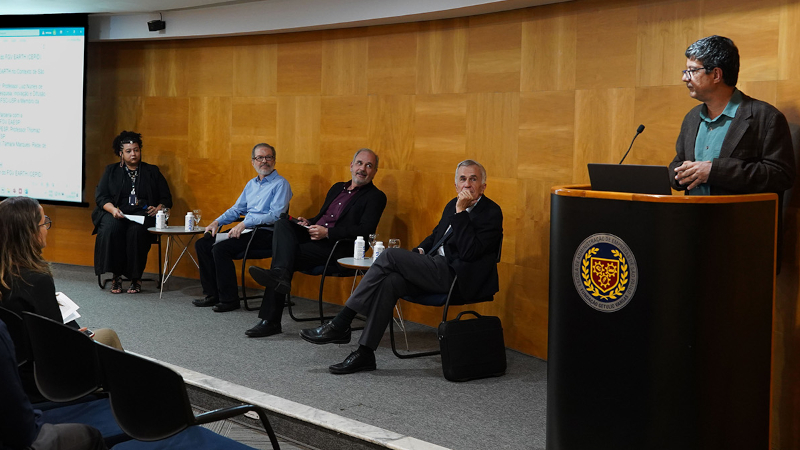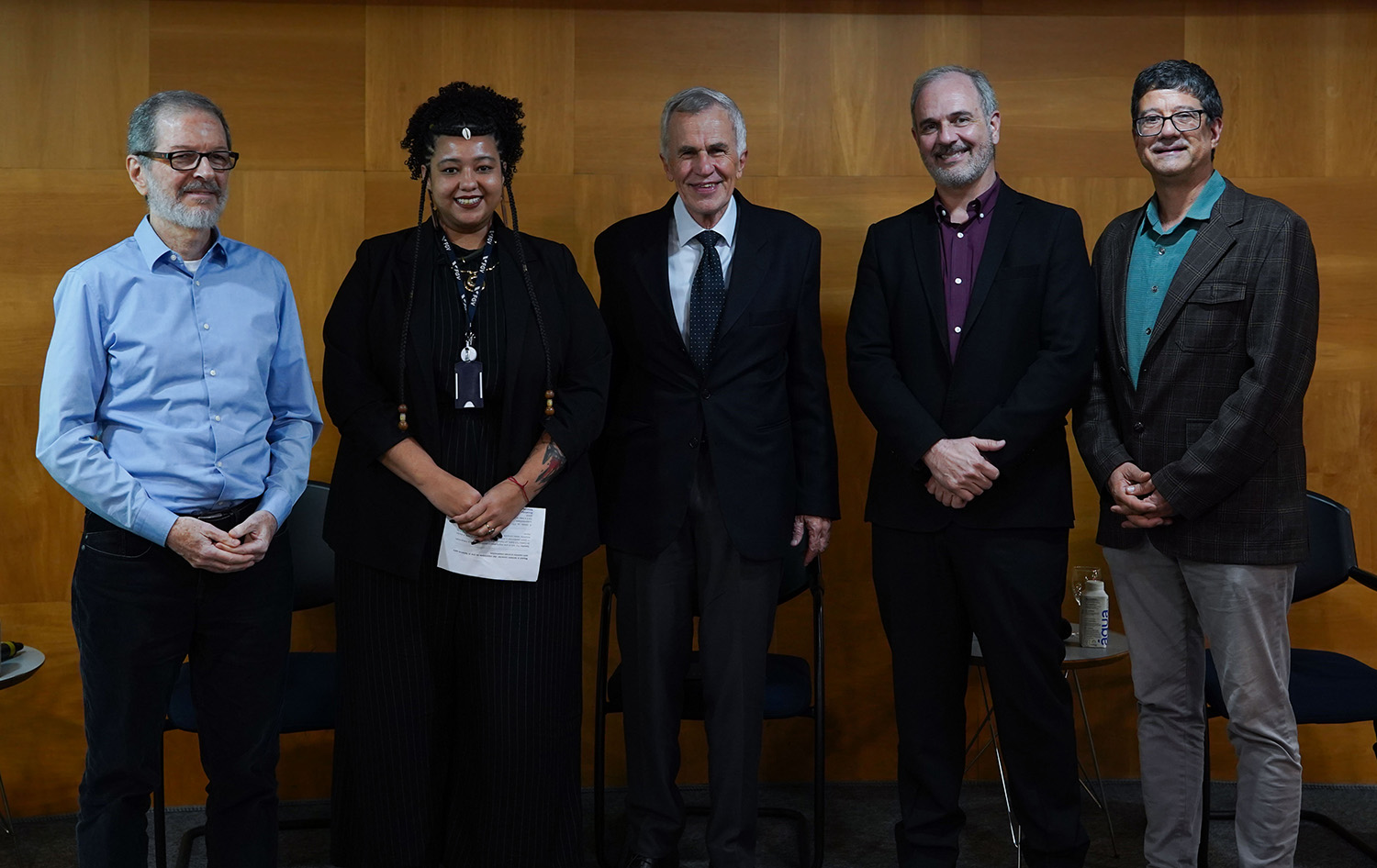

“We’ve already started with around 30 researchers, as well as postdoctoral and doctoral students,” celebrates José Antônio Puppim de Oliveira, coordinator of the new RIDC (photo: Daniel Antônio/Agência FAPESP)
FAPESP’s new Research, Innovation, and Dissemination Center is launched two months before COP30 and is expected to become an international reference for innovative solutions to environmental challenges.
FAPESP’s new Research, Innovation, and Dissemination Center is launched two months before COP30 and is expected to become an international reference for innovative solutions to environmental challenges.

“We’ve already started with around 30 researchers, as well as postdoctoral and doctoral students,” celebrates José Antônio Puppim de Oliveira, coordinator of the new RIDC (photo: Daniel Antônio/Agência FAPESP)
By José Tadeu Arantes | Agência FAPESP – In the context of the climate emergency and two months before COP30, the 2025 United Nations Climate Change Conference, the Getulio Vargas Foundation’s São Paulo School of Business Administration (FGV EAESP) has just inaugurated FGVearth, a Research, Innovation, and Dissemination Center (RIDC) on Global Environmental Change Governance, funded by FAPESP. It is expected to become an international reference for innovative solutions to environmental challenges.
According to José Antônio Puppim de Oliveira, the coordinator of the new RIDC, the conditions for this are in place. “We’ve already started with about 30 researchers, in addition to postdoctoral and doctoral students. Our mission is to disseminate the knowledge generated through seminars, workshops, reports, and direct interactions with companies and public policymakers,” he said.
Puppim spoke to Agência FAPESP at the launch ceremony for FGVearth on September 11 at the EAESP headquarters. He is a research professor at FGV and a collaborating professor at Fudan University in China and Universidad Andina Simón Bolívar in Ecuador. Puppim was also an assistant director and senior researcher at the United Nations University Institute for the Advanced Study of Sustainability in Japan from 2009 to 2015.
The initiative is part of FAPESP’s program, which funds long-term, high-impact projects that combine excellence in research, human resource training, and knowledge transfer to society. The program manager, physicist Luiz Nunes de Oliveira, attended the launch ceremony. He pointed out a striking feature of FGVearth. “What I find remarkable is that the staff at the center is working with a bottom-up approach. Instead of thinking only about high-level negotiations between the governments of countries, they’re putting small solutions at the forefront, involving citizens, companies, and cities, and that can scale up and generate global effects,” he said.
The originality of some solutions is evident in the three research goals of one of the new RIDC’s nuclei. “Degrowth”: Investigate how life in intentional sustainable communities (ecovillages) promotes degrowth practices to understand the cultural, emotional, and material factors of sustainable behavior. “Product Durability”: Examine how high-quality, durable products can promote sustainable consumption by reducing waste. “Reverse Socialization”: Investigate how children can act as agents of change, influencing their parents’ sustainable consumption practices through emotional appeals and role modeling.
These goals point in the exact opposite direction of the paradigm that has led the world to its current impasse, based on unlimited growth, rampant consumption, and irresponsible disposal.
International reach
The international reach of this new perspective was highlighted by two foreign experts present at the event: Maria Alejandra Gonzalez-Perez, a professor at EAFIT University in Colombia and a member of the FGVearth research team; and Govindan Parayil, a professor at the University of South Florida in the United States and a member of the FGVearth Advisory Board.
“This center is crucial because Brazil is once again becoming visible as the environmental capital of the world, as was the case at the Rio-92 and Rio+20 conferences. The fact that São Paulo is home to an institution of this size sends a long-term signal to the world: that we believe in science and informed decisions; and that we want to produce our own knowledge, and then disseminate it through international networks,” Gonzalez-Perez argued in a statement to Agência FAPESP.
Parayil added: “FGVearth is ambitious in creating a center of excellence that shows how Brazil can take the lead in addressing global environmental change, especially for the benefit of developing countries. I hope to contribute my experience in innovation for sustainable energy, helping to advance the transition to renewable sources.”
The inauguration of the new RIDC comes just two months before COP30, which begins on November 10 in Belém, in the Amazonian state of Pará. FGVearth researchers intend to play a leading role in this international forum, particularly with regard to the implementation of environmental policies in the Global South.
At a conference held on the eve of the launch of FGVearth, Gonzalez-Perez stated that “the world is at a crossroads: continue on the path of ‘business as usual,’ with accelerated impacts and loss of confidence in governance, or start a revolution in implementation, with justice at the center of decisions and innovation at scale.”
According to the expert, of the 1,500 global climate policies analyzed after the 2015 Paris Agreement, only 63 resulted in significant emissions reductions. In addition, there is an annual financial deficit of USD 6.3 trillion to enable the climate transition, highlighting the gap between the commitments made and their actual implementation. “This year, 2025, will be a ‘moment of truth’ for global climate action,” she pointed out.
With a commitment to “make a difference,” FGVearth is structured around six thematic areas, each focused on a strategic dimension of environmental governance: institutions for innovation, business practices, global environmental economics, marketing and consumer behavior, leadership, and cities. The scope and goals of each area were presented by their respective coordinators during the launch event. A summary can be found on the FGVearth website.
“Our innovation proposal isn’t technological, in the sense of generating patents, but rather innovation in the way we think, act, and create public policies and management tools, both within public and private organizations and on an individual scale. And it isn’t just about the climate crisis. It’s about the set of global environmental changes, involving biodiversity loss, desertification, plastic pollution, and the prospecting of minerals critical to the transition to sustainability,” Puppim summarized.
In addition to the new RIDC’s General Coordinator and Nunes, the panel at the FGVearth launch event included Tales Andreassi, Deputy Director of FGV EAESP, Thomaz Wood Jr, Research Coordinator at FGV, and Tamara Marques, International Partnerships Coordinator at FGV.

From left to right: Thomas Wood Jr., FGV Research Coordinator; Tamara Marques, FGV International Partnerships Coordinator; Luiz Nunes de Oliveira, RIDC FAPESP Program Manager; Tales Andreassi, Deputy Director of EAESP-FGV; and José Antônio Puppim de Oliveira, Coordinator of the new RIDC (photo: Daniel Antônio/Agência FAPESP)
More information can be found on the FGVearth website: eaesp.fgv.br/en/centros/center-innovation-research-and-diffusion-cepid-governance-global-environmental-changes/sobre.
Republish
The Agency FAPESP licenses news via Creative Commons (CC-BY-NC-ND) so that they can be republished free of charge and in a simple way by other digital or printed vehicles. Agência FAPESP must be credited as the source of the content being republished and the name of the reporter (if any) must be attributed. Using the HMTL button below allows compliance with these rules, detailed in Digital Republishing Policy FAPESP.






